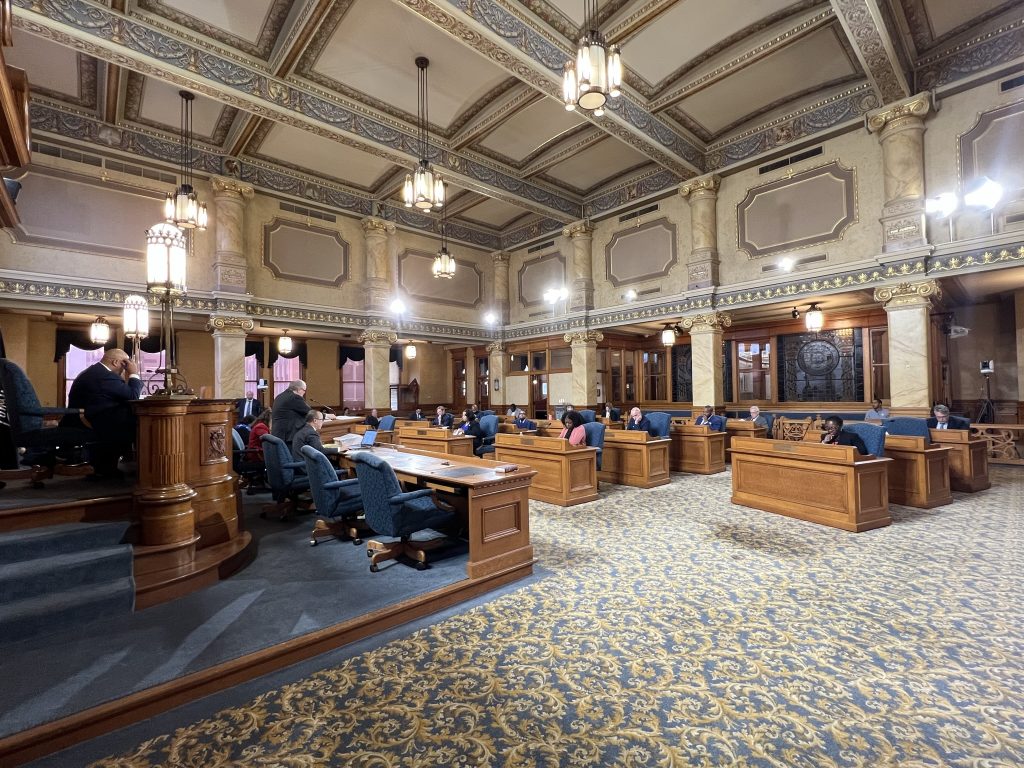2024 Milwaukee Budget Increases Services, Taxes
New sales tax allows city to avoid drastic cuts, but comes at a cost.
Milwaukee residents will pay more for city services in 2024, but they will also receive more.
Backed by a new 2% sales tax and the last year of a federal COVID-19 grant, Mayor Cavalier Johnson proposed a 2024 budget that included no notable cuts for the first time in more than a decade. The amended version adopted by the Common Council Friday added a small spending increase and further increased the operating hours of libraries, the number of streets being repaved and other city services.
Included in the adopted budget is the reopening of a previously-shuttered Milwaukee Fire Department station, the hiring of more police officers, increased funding for repaving streets, additional resources for building protected bike lanes and other traffic calming measures and a substantial expansion of the city’s vacant and damaged home demolition program.
“This is the essence of democracy, deliberation and compromise, and I think that’s what you have here,” said Finance & Personnel Committee Chair Marina Dimitrijevic shortly before the council voted. “We are turning a page for the City of Milwaukee. We are taking an important step forward… I think 2024 is the comeback year for the City of Milwaukee.”
“At this time last year we faced a lot of uncertainty. We weren’t sure if the city would be solvent,” said Council President José G. Pérez. He said the council must continue to ensure city resources are used for their “highest and best use,” but added that the 2024 process was “one of the most straight forward budget processes I can recall.”
The budget would increase the property tax bill on the median Milwaukee home, assessed at approximately $145,600, by $51.55 or 2.1%. The council’s amendments added $1.46 to the total, primarily through a $4.7 million omnibus amendment that expanded borrowing and reallocated funding. A 2% increase on fees would add approximately $10 to the average municipal services bill.
The city’s mill rate would be $9.47 per $1,000 of assessed value. The total levy is to be $317,696,575. The city’s property tax levy represents approximately a third of local property tax bills.
Residents and visitors will encounter a new 7.9% sales tax rate next year, an increase on the 5.5% current rate. The city was granted a 2% sales tax and Milwaukee County was given an additional 0.4% sales tax. Both taxes are to cover drastically rising pension costs. Surplus funding from the city’s tax must be spent on public safety until the city hits benchmark figures.
The council adopted its version of the budget on a 14-1 vote, with only Ald. Mark Borkowski in opposition.
“You would have thought that in a work of good faith, we could have thrown our Milwaukee taxpayers a bone and not had a tax increase this year in the first time in forever,” said the alderman, who is not running for reelection.
He said he still believed his July vote for the 2% sales tax was the appropriate thing to do. “We obviously knew it had to be done,” said Borkowski.
Council members, including fellow southside representative JoCasta Zamarripa, said it was important that the city wasn’t proposing any cuts and was expanding many services, including restoring a southside fire station.
The budget now goes to Johnson for possible line-item vetoes.
Amendments
The council adopted a number of amendments to the budget in addition to the omnibus proposal, which itself includes a lengthy list of new and expanded city programs. Additional amendments endorsed Friday would boost the Office of Equity and Inclusion, expand Hip-Hop Week MKE, hire an administrative services coordinator for the council’s expanded lobbying team and create a $250,000 maintenance fund for troubled Housing Authority of the City of Milwaukee (HACM) properties.
Johnson, via budget director Nik Kovac last week, is said to support a number of the council’s decisions in terms of the efforts funded, but disagrees with additional tax levy funding.
The largest amendment, a $4.7 million spending reallocation, was an omnibus amendment led by Dimitrijevic and Pérez and sponsored by seven other council members. Only Milele A. Coggs and Mark Chambers, Jr. voted against the proposal, with both noting their objection was because a large portion of its funding came from cutting in half a $5 million Citizen-Led Transformational Fund. The fund represented the last remaining funding from the city’s $394.2 million American Rescue Plan Act (ARPA) grant and was to be allocated by a task force chaired by Coggs.
The amendment would boost the number of streets and sidewalks repaired ($1 million), open three libraries on Sundays ($750,000), build more traffic calming and bike infrastructure ($750,000), fund inspections of HACM properties ($118,444), prune and plant more trees ($500,000), create a loan program for lead abatement repairs ($750,000), fund more small business grants for property improvements ($500,000), fund cameras to catch illegal dumping ($50,000), fund two spaces for victims of domestic violence ($50,000), add early voting at UW-Milwaukee and Milwaukee Area Technical College for the spring general election ($10,000), design a replacement for Swing Park ($100,000) and create a fill-in pool of legislative assistants for the council ($76,000).
In addition to being funded with $2.6 million from the transformation fund, the amendment was funded by reducing the planned increase in the city’s settlements account by $1.1 million, a $1 million increase in borrowing and $20,000 in previously unrecognized intergovernmental revenue. Debt costs associated with the amendment would be $25,000 in 2024.
An amendment from Chambers reallocated $500,000 in planned ARPA spending on police and fire radios to the Office of Equity and Inclusion to expand capacity for equity training, which he said had a lengthy waiting list. Another amendment from Coggs added $150,000 in new tax levy spending to the office to fund the job-connecting Direct Connect MKE program within the Office of Equity and Inclusion. Chambers said his proposal takes a “minute fraction” of the $19 million in payments planned for the $40 million radio project, while Ald. Scott Spiker warned it was endangering public safety officials by delaying radio purchases. Act 12, the sales tax law, doesn’t allow the city to directly spend tax levy support on equity and inclusion efforts, so Chambers sought ARPA funding sources. Other ARPA funding is in the mayor’s budget proposal to fund the office. “I think this is a perfect way to come together as a body to show that we are supporting the Office of Equity,” said the alderman of his amendment. It passed on a 10-5 vote with Lamont Westmoreland, Michael Murphy, Zamarripa, Borkowski and Spiker voting in opposition.
A proposal from Pérez to add $69,848 in new tax levy spending to fund an administrative services coordinator position and travel expenses for the council’s expanded two-person lobbying team, the Division of Legislative Affairs, was endorsed without discussion.
The city-sponsored Hip-Hop Week would receive an additional $30,000, bringing its funded total to $50,000 under an amendment from Khalif Rainey. Last week, Kovac said the 2023 program, which honored the music genre’s 50th anniversary, cost approximately $80,000 and relied on rollover funding. The additional funding, if not vetoed, would come from the tax levy.
An amendment from Chambers adding $20,000 in new tax levy spending to the existing $30,000 Community Excellence Fund. The fund is used to sponsor city events, including Girls Day at City Hall, the Alert Neighbor Program, Bronzeville Week, Black History Month, The Big Clean program, Hispanic Heritage Month, MKE Business Now Entrepreneurship Summit and the Juneteenth Day Celebration.
Borkowski, Spiker and Murphy voted against each of the amendments that expanded the tax levy.
A proposal by Murphy to reduce the streetlighting fee by 10% for one year by raiding $1 million from the transformation fund failed. “This is simply an attempt to reduce a little of the burden of citizens going into the 2024 budget,” said the alderman, who isn’t running for reelection. Only Murphy, Robert Bauman, Andrea Pratt, Borkowski and Spiker voted in support.
Coggs, as she has in recent years, successfully introduced several policy-focused footnotes that the council and city departments will need to effectuate with future actions.
Housing Authority Support
HACM would often go unmentioned during city budget debates because its operations are almost entirely federally funded. But Common Ground Southeastern Wisconsin members launched a campaign to repair what they say are deplorable conditions for the agency’s thousands of residents earlier this year and council members have sought to respond. On Friday, Common Ground members were the lone community group to attend the budget meeting.
The omnibus amendment allocated funding to hire two new Department of Neighborhood Services (DNS) inspectors, with the council previously approving a policy change to require inspectors to review the properties. Three additional inspectors were authorized, with funding to possibly come from reinspection fees.
But Bauman has repeatedly warned his colleagues that inspections won’t solve HACM’s problems on their own. “As we all know, when DNS issues an order for repair that doesn’t mean there are repairs,” said the alderman in advocating for his amendment that would create a support fund to make sure the work happens.
After a substantial back-and-forth involving several council members, Bauman and Russell W. Stamper, II saw their proposal to create a $250,000 fund for repairs adopted on a 10-5 vote with Coggs, Murphy, Spiker, Dimitrijevic and Pérez in opposition.
Funding would come from cutting approximately half of the funding to study a replacement for the fire-damaged recycling center, the Materials Recovery Facility. “Any budget amendment that comes to us with a very precise number is very mysterious,” said Bauman of the capital budget’s $456,174 allocation for the recycling facility. Administration officials previously said the amount was determined before the fire occurred and based on other planned needs. Bauman said funding would still be available to advance a lengthy repair or relocation process. “The impact to the Department of Public Works, in my judgment, is zero.”
But the proposal didn’t have support, in part because it amounts to a bailout of the city-supported agency.
“I am very hesitant to say we should start using levy dollars to support what is the federal government’s responsibility,” said Murphy.
“I see this as a one-time, extraordinary expenditure to let them catch up,” said Bauman. He noted that the constituents were often impoverished or disabled, the very people the council often says it wants to help.
Pratt, the lone council member to previously work for the authority, said the funding was “definitely needed.”
Bauman had previously proposed raiding the transformation fund to make it $2.4 million with no success.
Challenges Loom in 2025
A structural deficit of tens of millions of dollars is expected to return in 2025.
The requirements embedded within Act 12 add substantial costs in addition to providing new revenue. Because the pension system is closing to new entrants, the actuarial estimates that determine the required contribution have increased dramatically. The city now expects to contribute $175 million annually until the system is fully funded, an increase of tens of millions of dollars annually. In addition, Act 12 eliminated the five-year smoothing formula, which could result in dramatic one-year spikes or declines in pension payments based on financial market performance.
The labor market is also forcing the city to increase salaries and hourly wages for jobs continually. For the second consecutive budget, all general city employees will receive a 2% increase. A proposal to raise for wages for city department heads and elected officials is pending.
The city will also have less funding available in 2025. The remaining ARPA funds are being used on salaries in 2024, to meet a use-it-or-lose-it federal deadline.
Through a series of complicated formulas, Act 12 also requires the city to consistently increase its police and fire staffing to reach certain targeted levels.
There is also a one-time surprise in the 2024 budget. The city must make a $25.5 million “catch up” pension payment. Kovac, a longtime member of the city’s pension board, said the issue can be attributed to the timing of when the city makes its payment based on estimated data versus the actual required contribution, calculated later in the year, and the elimination of the five-year smoothing formula. That one-time payment will be almost entirely offset by the approximately $22 million annual increase the city will receive in its state-shared revenue payment.
It’s a much smaller gap than without Act 12, when up to 1,300 jobs were expected to be eliminated, but Milwaukee will still find itself needing to alter how it provides services in 2025. “While the city’s likely budget gap for 2025 will not be equal to the $110.3 million in ARPA funds that will disappear after 2024, a gap of $35 million to $45 million is not inconceivable,” says a Wisconsin Policy Forum analysis of the 2024 budget.
If you think stories like this are important, become a member of Urban Milwaukee and help support real, independent journalism. Plus you get some cool added benefits.
More about the 2024 Milwaukee Budget
- Council Overrides Mayor’s Veto, Adopts 2024 Milwaukee Budget - Jeramey Jannene - Nov 21st, 2023
- Mayor’s Veto Reduces Property Tax - Jeramey Jannene - Nov 14th, 2023
- Fight At City Hall Over Control of Board of Zoning Appeals - Jeramey Jannene - Nov 8th, 2023
- Full Legalization of Scooters Ends Up In City Budget - Jeramey Jannene - Nov 3rd, 2023
- 2024 Milwaukee Budget Increases Services, Taxes - Jeramey Jannene - Nov 3rd, 2023
- Council Debates 53 Budget Amendments, Adds Spending, Services - Jeramey Jannene - Oct 26th, 2023
- Tentative Deal Would Salvage Milwaukee’s Deconstruction Program - Jeramey Jannene - Oct 25th, 2023
- City Hall: Budget Amendment Would Boost Libraries, Streets, Voting and Lead Abatement - Jeramey Jannene - Oct 20th, 2023
- City Hall: Council Wants New Deal, Says Convention Center ‘Outsmarted’ City - Jeramey Jannene - Oct 16th, 2023
- Fire Department Reopening Station At 13th and Layton - Jeramey Jannene - Oct 15th, 2023
Read more about 2024 Milwaukee Budget here
More about the Common Ground Housing Authority Campaign
- After Lawsuit Revelations, Housing Authority Expands Executive Search - Jeramey Jannene - Feb 6th, 2026
- Finalists Named For Top Housing Authority Role - Jeramey Jannene - Jan 9th, 2026
- Housing Authority HR Manager Terminated, Audit Finds Culture of Nepotism - Jeramey Jannene - Aug 15th, 2025
- Council Committee Backs Mayor’s Picks for Housing Authority Board - Jeramey Jannene - Jul 28th, 2025
- Housing Authority’s Financial Woes Worse Than Previously Reported - Jeramey Jannene - Jul 24th, 2025
- City Hall: Housing Authority Says City Didn’t Cash More Than $2 Million In Checks - Jeramey Jannene - Mar 6th, 2025
- City Housing Authority Reopens Wait List - Jeramey Jannene - Mar 5th, 2025
- Facing Common Ground Opposition, Housing Authority Board Nominee Bails - Jeramey Jannene - Feb 27th, 2025
- Common Ground Opposes Mayor’s Housing Authority Nominee - Jeramey Jannene - Feb 25th, 2025
- Comptroller Discovers Housing Authority Owes City An Additional $4 Million - Jeramey Jannene - Feb 17th, 2025
Read more about Common Ground Housing Authority Campaign here
Political Contributions Tracker
Displaying political contributions between people mentioned in this story. Learn more.
- February 20, 2016 - Cavalier Johnson received $250 from Robert Bauman
- May 7, 2015 - Nik Kovac received $10 from Cavalier Johnson





















Good for Mark Borkowski. As he said, after being hammered with a new tax about the first these jokers proposed was raising salaries. Now it is more new taxes. They never stop. The Common Council is best at raising taxes and blowing money on nonsense. Of course, the money is spent where it will help those in office, not on anything meaningful for the people of the city. How many blocks will that $1 million repave? 5, 10, 25? The Council could care less. About 66% of them are gold-differs, hopping from one job to the next. That IS their job. Using your money to get ahead. This will be a good question for the candidates to replace Borkowski. Would you have voted no on this budget proposal? I won’t vote for anyone who refuses to answer or answers yes.